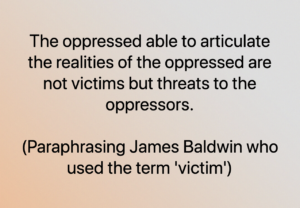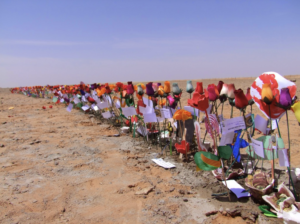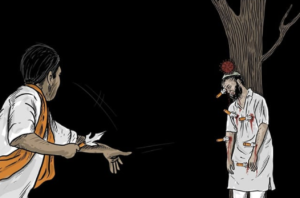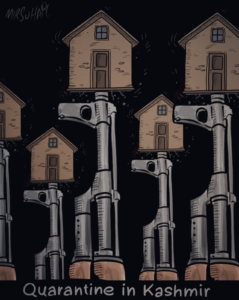
Monthly Archives: April 2020

A friend proposed using the lockdown for a project to study freedom struggles around the world. The point is to learn together about these freedom struggles so that we will emerge from quarantine in a stronger position of international solidarity with our oppressed brothers & sisters. The struggles would include Palestine, Syria, Iraq, Kashmir, Uyghur, Rohingya, Sahrawi, West Papua, Nauru, refugees, the Libyan slave trade, Somalia, Yemen, Indigenous struggles in Latin America, Africa, North America, Asia. Others are invited to participate in the project where one would write a brief presentation about an aspect of a freedom movement & then share it with us on social media. This is the first presentation about the Sahrawi freedom struggle in Western Sahara with the story, a photo & a poem from the struggle, & a video documentary.
*********
Many of us remain unaware of the last colony at the western coast of Africa, the Western Sahara with a population of 600 000. During colonisation, Spain took control of Western Sahara and France took control of Morocco. In 1956, Morocco gained its independence from France and then in 1975 proceeded to invade the Western Sahara. When Spain left, Morocco, Mauritania and the Polisario, an independence movement, fought over Western Sahara. Mauritania eventually renounced its claim and backed the Polisario. The UN brokered a cease-fire in 1991 and the parties agreed to a referendum in which the people would vote for independence or Moroccan authority. The vote never happened.
Morocco built a 2,700 km sand wall (or “berm”) in the nineteen-eighties. It is the longest defensive fortification in use today and is surrounded by watch towers, land mines, electric fences, and barbed wire. Morocco controls three-quarters of the area west of the wall. Sahrawis are the indigenous ethnic group forced to live in Moroccan-controlled areas or in Algerian refugee camps. The Sahrawis have been displaced and have become refugees in their own lands. Their cities are occupied, under total surveillance and they suffer total repression and militarisation. Sahrawi journalists, students and activists are often arrested and tortured and for the most part their plight exists under a media blackout. They are still waiting for the referendum that will decide their fate.
Children of the Sun and the Wind
We still live
on the brink of nothingness,
between the north and south of the seasons
We still sleep
on stone pillows,
like our fathers
We still follow the same clouds,
resting in the shadows of thorn trees
We still drink down our tea while swallowing fire
and we walk barefoot not to frighten the silence
And in the distance
at the edge of the mirage
we still watch, every evening
the sun fall into the sea
And the same woman greets us
while she posts lookout for the dusk
in the middle of the map
She greets us, then is lost
in the eyes of a child
smiling from the lap of eternity
And we still wait
for a new dawn
We still wait to begin again
-MOHAMMED EBNU
Mould Yeslem has led and organized the project “Por Cada Mina Una Flor”—For Every Mine a Flower, which collects flowers with written messages of solidarity with Sahrawis and plants them in front of the berm.
(Image by Samia Errazzouki)
Documentary: The Runner (Trailer)
On the weekends, I work as a healthcare provider for a woman who has a compromised immune system & in fact is presently sick with a respiratory illness. No one from the agency has contacted me about screening for corona though they did send me a letter to carry if police question me about why I’m not quarantined. The woman asks me to shop at Walmart for her (which is something I put a stop to). Walmart is jam packed with shoppers but using some safety measures. None of its employees who I’ve asked have been screened for corona & only use a mask for protection. They are completely vulnerable to the virus because of their constant proximity to hundreds of shoppers.
The virus cases in the US are now almost 577,000 & spreading exponentially. If they want to stop the spread, they will have to screen essential workers who are involved with the vulnerable or with the public & maximize protection for those, especially medical personnel, who work directly with those affected. But Trump is still scratching his ass in confusion & more worried about reelection than about us plebeians who could die. The NY Times wrote a few long excoriations of the Trump regime’s response & they are damning.
https://www.nytimes.com/2020/04/13/opinion/letters/coronavirus-trump-response.html?
“I won’t tell your father you have died, Rizwan,
but where has your shadow fallen, like cloth
on the tomb of which saint, or the body
of which unburied boy in the mountains,
bullet-torn, like you, his blood sheer rubies
on Himalayan snow?”
-Kashmiri poet Agha Shahid Ali
#Kashmir #indpak #loc #war #childrenkilled #death #fear #occupation #blood
I won’t tell your father you have died, Rizwan,but where has your shadow fallen, like clothon the tomb of which saint, or the bodyof which unburied boy in the mountains,bullet-torn, like you, his blood sheer rubieson Himalayan snow?-Agha Shahid Ali#Kashmir #indpak #loc #war #childrenkilled #death #fear #occupation #blood
Posted by Mir Suhail Qadiri on Monday, April 13, 2020

Mir Suhail Qadiri protested censorship of this political art depicting how India is using coronavirus to increase persecution of Muslims: “Facebook said my art violates their community standards. Apparently critical commentary on preexisting violence against Muslims in India is not ok but hundreds of people who posted underneath this cartoon about their happiness at the horror we are seeing are doing good.”
The occupation of Kashmir during a time of coronavirus by Mir Suhail Qadiri.

Quarantine life in Kashmir
#indpak #loc #war #kashmir #covid_19 #quarantinelife
By Mir Suhail Qadiri
Some fellow tweeted that ‘It’s really shameful for anyone to politicize the corona outbreak. All are equal to this microbe which doesn’t differentiate between ethnicity, color, faith, rich, poor, master, servant, king, or guard.’ It’s a touching egalitarian sentiment but there isn’t a stitch of truth to it. Several celebrities got the virus & some even died but not before receiving the best medical care money can buy. What’s undeniably political about this pandemic is that it is highlighting the fault lines of inequality. When the majority in the US who contract & die from the illness are from the Black community, that is undeniably political. When political prisoners, refugees, the homeless, urban slum dwellers, minimum wage workers, & occupied nations who all lack proper medical care are threatened by this virus, that is undeniably political. Talking about the politics of this pandemic is not about cashing in on human suffering to build one’s own political current but about the realities many people insulate themselves from during normal times.
A slow internet in Kashmir is speeding the spread of coronavirus: What is true in Kashmir is just as true in Rohingya refugee camps where Bangladesh has snapped the internet & in Palestine where only a limited number even have access to the internet. Governments are using the coronavirus to accelerate their political goals which include genocide.
The region is accustomed to lockdowns, but New Delhi’s ban on high-speed internet is undermining the medical community’s ability to fight the pandemic.
We can talk about the ways a medical lockdown differs from a military lockdown under occupation because there are significant differences. Most of us don’t have to go through military checkpoints or fear violence from soldiers to go to the supermarket. Most of us aren’t harassed & threatened in our own homes. But this medical lockdown is mighty stressful. That should make it easier for most of us to understand just how oppressive & violent the lockdowns of Kashmiris, Palestinians, & Uyghur really are. We need to build on that understanding to build the solidarity movements to oppose occupation & colonialism.
The game going round Facebook:
When this lockdown is over, the first house I’m going to visit for breakfast is Satyadeep Satya. Then I’m going to lunch with Rollie Mukherjee, for a cup of coffee with Aahil Asif & will go for evening snacks with Lori Dee Desgranges. Finally I will have dinner with Micheal Clinton.
Then I will start the same party round over till I have met all my friends.